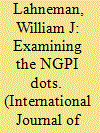| Srl | Item |
| 1 |
ID:
144832


|
|
|
|
|
| Summary/Abstract |
During 2015 Prime Minister Cameron found himself under intense domestic and international pressure over his apparent reluctance to maintain United Kingdom defence spending at the NATO target level of 2 per cent of GDP. Most commentators attributed this reluctance to the inevitability of defence cuts if the government wished to meet its deficit reduction targets. However, the aftermath of the general election saw a sudden decision to maintain UK defence spending at the NATO target level. This u-turn is one of the more curious episodes in recent British defence policy. In this article we explore the reasons why, at a time of continuing cuts and austerity measures and against all the political signals, a decision was made to meet the 2 per cent target, and what this means for the UK's defence policy. In doing so, we analyse why most commentators assumed that defence cuts were inevitable, the domestic and international factors that explain the government's apparent u-turn and what this revised defence budget settlement meant for the new 2015 National Security Strategy and Strategic Defence and Security Review.
|
|
|
|
|
|
|
|
|
|
|
|
|
|
|
|
| 2 |
ID:
124002


|
|
|
|
|
| Publication |
2013.
|
| Summary/Abstract |
National intelligence is still organized around the collection disciplines of the home agencies, not the joint mission. The importance of integrated, all-source analysis cannot be overstated. Without it, it is not possible to "connect the dots." No one component holds all the relevant information.
The 9/11 Commission Report, 22 July 2004, p. 408.
Although the 9/11 Commission Report 1 is over 400 pages long, its catchphrase about the Intelligence Community's (IC's) failure to "connect the dots" most succinctly captures one of the principal things that went wrong with the U.S government's efforts in general, and the IC's attempts in particular, to detect al-Qaeda's attack plans. General agreement prevails that the chance of detecting al-Qaeda's plans would have been improved if the IC had been able to pool, fuse, and analyze all of the relevant information about al-Qaeda's plans that various U.S. government agencies possessed prior to the attacks. As a result, the Commission strongly emphasized the need to improve information sharing across multiple IC and other government agencies to improve the IC's chances of detecting future attacks.
|
|
|
|
|
|
|
|
|
|
|
|
|
|
|
|